Utility companies are buying into solar power and this is a triple play for these outfits, their customers and investors.
Several of the largest U.S. utility companies are moving into the solar power business. While utility companies still lean heavily on coal and natural gas as power sources, the transition into solar and other green technologies is underway.
Solar Energy at a Glance
My last article considered three of the leading solar power companies as buying opportunities for investors. But the overarching problem from an investment perspective is the inability of these firms to make a profit. Many solar power champions argue that using solar energy has drastically reduced their energy costs. And solar energy is obviously more sustainable for the environment.
That said silica is one of the key minerals used in the creation of solar panels. And much of this is mined in the Democratic Republic of the Congo (“DRC”) or adjoining countries. These war torn regions of Africa have suffered decades of violence as these warring neighbors vie to control so-called conflict minerals. So the question remains as to how access to and the price of silica will be affected by future conflicts.
Moreover, the pricing models of the largest solar panel providers depend on long term leases. It is unclear at this time whether these companies can generate enough revenue from the leasing model to ensure future growth and profits.
In the meantime, leading utility companies like American Electric Power Company Inc (NYSE:AEP), Duke Energy Corp (NYSE:DUK) and NextEra Energy, Inc. (NYSE:NEE) could become dominant players in the solar energy sector simply because they rely on diverse energy sources.
American Electric follows the sun
American Electric Power Company Inc (NYSE:AEP) is a leader in the generation, transmission, and distribution of electric power to retail customers. This Ohio based power company has long relied on coal to generate electricity. And the company has more recently consumed more natural gas as a power source since these fuel prices have become cheaper.
American Electric Power Company Inc (NYSE:AEP)’s market cap is $22.3 billion and shares are up about 5% this year along with a dividend yield of 4.3%. This is a key factor for investors in addition to rising revenues and share price in the past year. However, earnings per share have fallen a bit in the most recent quarter – 6.3% compared to the same quarter in 2012. This is mostly because of weaker income growth. But analysts anticipate earnings to bounce back this year to $3.15 which should be reflected in the share price.
Going forward American Electric Power Company Inc (NYSE:AEP) sees the future in the “all of the above” strategy favored by the federal government, energy companies, as well as customers and investors. The company initially intends to get into the solar sector by leasing commercial rooftop space and building out solar energy panel hubs. If the venture is successful the company hopes to cut production costs which, in turn, will improve revenues and earnings in the long term.
Duke is King Harvest on the solar farm
Duke Energy Corp (NYSE:DUK) operates in the United States and Latin America. The company has a history of solid revenue and net income growth as well as in earnings per share. However, this has not been reflected in the recent performance of its share price even though shares are up this year by more than 4%.
Their US arm has a market cap of $48.2 billion and a P/E ratio of 20.6 – above the S&P 500 P/E ratio of 17.7. So Duke Energy Corp (NYSE:DUK) will need to see better earnings going forward – and the move into solar may prove helpful. A consensus of analysts consider Duke Energy Corp (NYSE:DUK) to be a “hold” at this time.
However, in 2009, Duke Energy Corp (NYSE:DUK) began building and operating solar projects for commercial business customers in the U.S. Now, through its “Duke Energy Renewables” unit, the company owns 11 large scale “solar farms” in five states. Their goal is to provide solar energy solutions tailored for other utility companies, municipalities and large business customers. This unit is also developing commercial wind energy projects aimed at reducing costs and thereby rates for its customers.
NextEra: Solar power for the ethical investor
NextEra Energy, Inc. (NYSE:NEE) owns Florida’s largest utility. The outfit has had a head start against Duke Energy Corp (NYSE:DUK) and American in the solar energy sector. In fact, NextEra Energy, Inc. (NYSE:NEE) has a separate unit dedicated to developing large wind and solar farms.
The utility’s share price is currently hovering at about $78, a bit lower than the 52 week high of $82.65. But its share price is up by about 15% this year. Some observers argue that there is room for growth in the long term because NextEra Energy, Inc. (NYSE:NEE) is already a leader in using sustainable energy sources.
Finally, the company has been previously rated as one of the best socially responsible energy companies by Forbes Magazine (2011). This is because outfit is the largest generator of renewable energy from wind and solar polar in North America. In sum, NextEra Energy, Inc. (NYSE:NEE) is an attractive investment not only because of potential earnings growth, but also a good play for investors focused on ethical investing.
The Bottom Line
The so-called “all of the above” approach to meet the needs of energy providers and customers is the wave of the future. And investors with a long term view can ride the wave by investing in these and other utility and energy companies that are implementing this energy strategy. To borrow a line from a Beatle’s chestnut, here comes the sun.
The article Utility Companies Going Solar originally appeared on Fool.com and is written by Kyle Colona.
The Motley Fool has no position in any of the stocks mentioned. Kyle is a member of The Motley Fool Blog Network — entries represent the personal opinion of the blogger and are not formally edited.
Copyright © 1995 – 2013 The Motley Fool, LLC. All rights reserved. The Motley Fool has a disclosure policy.



